- Home
- Amanda Stevens
Secret Passage Page 6
Secret Passage Read online
Page 6
Every warning bell in his head clanged an alarm, but still he couldn’t tear his gaze away. “I can’t help thinking we’ve met before,” he murmured, his gaze tracing her features.
“In another time maybe,” she said lightly. She twisted the locket around her finger. “If you believe in that sort of thing.”
Chapter Five
Zac waited until the lights had been turned out in the ward, then he got up quietly, slipped on his clothes and left the hospital. The moon was just creeping over the treetops as he made his way along the unfamiliar streets.
From the many briefing sessions he’d had with Von Meter, Zac had a pretty good idea of the layout of the town. For weeks after that first night at the old man’s town house, he’d pored over archived maps and documents, been drilled relentlessly by Von Meter and sometimes Vogel, until he knew the area around Oak Ridge as well as he knew his own Philadelphia neighborhood.
He also knew that getting inside the fence—getting to Kessler—would be no easy feat. The city was heavily fortified. Guards patrolled the borders and manned outposts around the clock, and no one was allowed inside the reservation without a pass or a purpose.
But Zac’s more immediate concern was transportation. He had a lot to do tonight, and traveling on foot would soon eat up the precious few hours he had until midnight when the graveyard shift came on at the hospital. He didn’t want to be reported missing when the nurses made their rounds. So far he’d been fortunate enough to escape the attention of the local authorities, but now that he’d come out of the coma, he knew they’d have questions.
And right behind the local authorities would come the Security and Intelligence Division and the FBI. If either agency became overly suspicious of him, they could arrest and detain him for weeks, months, possibly for the duration of the war. Zac couldn’t allow that to happen. Keeping a low profile was imperative.
Hugging the buildings for cover, he made his way to the town square and from there, he headed north on Edgemont Avenue where Betty Wilson, the blond nurse, had mentioned that her aunt lived.
Eager for male companionship, the young nurse had freely imparted a wealth of information about her personal life. The seemingly endless chatter might have bored anyone else, but Zac had soaked it all in, knowing that the most mundane tidbit could prove useful in the future.
And he’d been right. Earlier, Betty had mentioned in passing that her aunt had taken the bus to Nashville to visit an ailing relative, which meant that her house would be empty, and, more important, her car would be unattended while she was gone.
The house was easy enough to find even in the dark, and, to Zac’s relief, it did indeed appear deserted as he circled around to the back. Letting himself into the shed that sheltered the car, he whistled softly as his gaze lit on the 1937 Packard. The deep red fenders and upright chrome grill shimmered in the moonlight, but he took only a moment to appreciate the vehicle’s sleek lines before he climbed inside, put the car in neutral and, with one foot on the ground and one shoulder against the frame, pushed until it began to roll silently down the drive.
The street in front of the house was on a gentle slope, and Zac kept the car coasting until he reached the end of the street. Jumping inside, he closed the door and prayed the battery wouldn’t be dead as he pressed the starter button. To his relief, the engine caught and roared to life.
Heading south, he cranked down the window to let in the night air. There were no other cars on the road, and even over the steady purr of the V12 engine, the countryside seemed sleepy and silent. The farmhouses he passed along the way looked dark and desolate, the silhouettes eerie in the moonlight.
The whole night had a surreal quality to it, he decided. It felt a little like being trapped in a dream.
Two miles out of town, he turned onto a narrow gravel lane, drove for another quarter of a mile or so, then pulled to the side and parked. Farther down the road, he could see the lighted window of a house, which meant that people were still up. He didn’t want the sound of the car engine to attract unwanted attention, and besides, from where he’d parked, it was only a short hike to the mine.
He got out of the car and glanced around, his senses on high alert. Crickets chirped in the ditches, and the occasional firefly flitted through the trees. But other than that, nothing disturbed the solace. It was a hot, still night, and a strange loneliness tugged at Zac’s heart. Maybe he was just homesick, he thought wryly as he scanned the countryside. After all, he was a long way from Philadelphia. The Philadelphia he knew, anyway.
In the distance, a series of ridges rose, like humps on a camel, against the horizon. Zac knew the mine was up there somewhere. He searched his memory and began to walk.
As he neared the first house, voices drifted out of the darkness, and his first instinct was to melt into the nearby woods. Instead, compelled by curiosity, he followed the sound until he stood at the edge of the yard.
Three boys played chase in the moonlight, their childish laughter deepening Zac’s strange melancholy. He knew he should keep moving, but he couldn’t seem to make his feet obey. Finding a hiding place behind a hawthorn bush, he watched the boys dart in and out of shadows.
“You’re it, Billy!” one of the older boys shouted.
“Am not!” the smallest boy retorted. “I tagged you!”
“You didn’t even get close to me!”
“Did, too!”
The door to the house swung open and a stream of yellow light flooded into the yard. Zac automatically crouched lower in his hiding place.
“Boys!” a woman called. “Time to come in and get ready for bed.”
“Ah, it’s too early for bed!” one of the older boys complained.
“Yeah,” the little one echoed. “It’s too early for bed.”
“No, it’s not. It’s after nine and you have to be up early to get your chores done—” The woman broke off as something shaggy shot past her legs.
The dog bolted from the doorway and made a beeline across the yard, straight for Zac, with all three boys in hot pursuit.
“Daisy, wait! Daisy!”
The dog, frantic with excitement, almost made it to Zac’s hiding place before one of the boys grabbed her and drew her up short. The dog, straining to get loose, began to bark at the top of her lungs.
“What’s the matter with Daisy?” the smallest boy asked worriedly.
“There’s something out there,” one of the older boys said in a hushed tone.
“It’s probably just a squirrel or something,” the other one said with a shrug.
The woman hurried across the yard toward them. “Daisy,” she commanded. “Stop that infernal noise! Heel, girl!”
To Zac’s amazement, the dog fell whimpering to the ground, paws over her head.
The boys dropped to the ground around her. “Good girl. Good Daisy.”
“You boys go inside like I told you,” the woman scolded. As she neared the edge of the yard, Zac could see her more clearly. She was an older woman, tall and stoutly built with a harsh voice and nervous mannerisms. “I’ll take care of Daisy.”
The boys put up an argument, but the woman held her ground and finally the three took off across the yard toward the house. The woman bent down and patted Daisy’s head. “What’s out there, girl? What do you see?”
The dog continued to whimper. Straightening, the woman peered into the darkness. For a moment, it seemed to Zac that she stared straight at him, then her gaze moved on. “Is someone there?” she called. Then, more softly, “Have you come?”
When all remained silent, she turned back to the house. “Come, Daisy.”
When the dog hesitated, the woman’s voice rose harshly. “Come, Daisy! Schnell!”
THE FILMY CURTAINS FLOATED ghostlike on the breeze as Camille sank to the floor and folded her arms on the windowsill. Shivering, she gazed out over the lake. She still wasn’t used to how quickly darkness fell over the remote countryside, how utter and profound the silence. It was hard to b
elieve that half a world away, a war raged on.
But here, deep in the hills of Tennessee, she could hear nothing but the rustle of leaves in the sweet gums and more distant, the call of a whippoorwill somewhere up on the ridge.
The plaintive cry brought on an unbearable loneliness, and grief constricted Camille’s heart until she could hardly breathe. How much easier it would be just to go to sleep…and never wake up.
Would Adam be waiting for her on the other side?
The lure to find out was almost irresistible at times, but death was a luxury she couldn’t afford. There was still too much to do. Too much was at stake.
But the pain… How much longer could she endure it? No matter how many months, years, decades passed, she knew it would never go away. She would always mourn her son. Ten years from now, she would still ache for his smile. Twenty years from now, she would still weep on his birthday. Time would not make any of that go away. Time would not ease her suffering.
Only one thing could do that.
She clutched the locket at her throat. On nights like this, when the pain was at its worst, Camille turned her mind to revenge.
In her heart of hearts, she knew it wasn’t right to blame Zac for Adam’s death. He was a victim of Von Meter’s maniacal ambition just as the dozens, if not hundreds, of others who had passed through the underground bunkers at Montauk.
Subjected to radical experiments, Von Meter’s “super soldiers” had been brainwashed and tortured, their lives and minds manipulated until little remained of the person they’d once been. Then they were cut loose to become drifters and mercenaries—or worse—who used their extraordinary skills for money, power and sometimes for a dark, twisted pleasure.
Devastated by the metamorphosis of the technology he’d pioneered, Dr. Nicholas Kessler—Camille’s grandfather—had made it his life’s work to seek out these men, to try and undo the damage done to their minds and to their lives.
Some of them could be saved. Some could not. Zac Riley was one of her grandfather’s failures.
Although there had been a time when Camille thought that she, alone, could save him. The hubris of youth, she supposed. Or the blindness of love.
When she’d first gone to work in her grandfather’s organization, he’d warned her that getting personally involved in the cases could prove disastrous. They could never be certain of their success, he’d reminded her, because some of the “triggers”—not unlike posthypnotic suggestions—had been planted so deeply in the victim’s subconscious that they remained hidden even under intense psychotherapy.
But, in spite of her grandfather’s warnings, Camille had been determined to save Zac…from Von Meter and from himself. And, for a time, she’d succeeded. Or so she thought.
Then, one morning, she’d awakened to find him gone. He’d left during the night without a word or a note, the subconscious pull that compelled him evidently a more powerful stimulus than his feelings for her.
That had been five years ago. Camille hadn’t seen him again until she’d found him half-dead in the mine, and she knew his presence here could mean only one thing. He was still under Von Meter’s control, and she would be a fool to trust him.
ZAC HAD BEEN UNCONSCIOUS when Camille and the boys had dragged him out of the mine and down the side of the ridge, but he wasn’t unfamiliar with the terrain. Before he’d entered the wormhole, he and Von Meter had flown down to Tennessee and walked the area—or rather, he’d explored while the old man had remained behind in their Knoxville hotel—until he knew the area by heart.
To Zac’s surprise, the countryside had hardly changed. The road that led to the lake would be paved thirty years from now and a waterfront housing development would spring up during the boom of the eighties. But, for the most part, the region would remain rural and the trail up the face of the ridge would become even more overgrown with vines and brush until almost all traces of the early coal-mining days had disappeared.
Zac had spent hours studying local landmarks—the shape of the ridges, the contour of the lake—so that even sixty years back in time, he would still be able to get his bearings and pinpoint with some accuracy his location.
It had been time well spent because even in the darkness he had little trouble locating the trail and, a few minutes later, the mine. Clicking on the flashlight he’d taken from the nurses’ station, he shined the beam around the tunnel until he once again had his bearings.
Following the railroad tracks that led back into the hillside, he made his way through the narrow confines until he came to a fork. Bearing right, he bypassed the first opening, moving deeper and deeper into the hillside until at last he reached a second tunnel. This time he turned left, and the passage eventually became so restricted that his shoulders brushed the sides as he crept along.
Deep inside the earth, his senses sharpened. Somewhere in the distance he could hear the drip of water and the occasional thud of loose gravel hitting the dirt floor. In spite of the nurses’ conclusions, Zac didn’t believe he’d been caught in a cave-in, but he was mindful of the danger just the same.
He still couldn’t remember what had happened to him once he’d left the wormhole, but he had a strong suspicion that he’d been attacked in the mine and left for dead. He had no idea of the identity of his assailant or why someone wanted him dead. If the attacker knew who he was, that could mean only one of two things. Someone had followed him through the wormhole…or someone had been lying in wait for him. Either scenario presented a big problem. The presence of someone else from the future wasn’t something Zac or Von Meter had counted on.
Ducking his head, Zac entered a small tunnel littered with rubble. Kneeling, he placed the flashlight on the floor beside him, then carefully began to dig through a pile of stones until he uncovered a weatherproof duffel. Quickly, he unzipped the bag and, shining the flashlight inside, rifled through the contents—a quarter of a million dollars in cash, sheets of ration coupons, counterfeit documents that would help him maneuver through governmental red tape and near the bottom, a .44 caliber Desert Eagle semiautomatic with a silencer. Everything was still there, including the gold medallion.
Picking up the weapon, Zac checked the clip, then returned it to the bag. Until he was released from the hospital, the gun and the cash were safer here than with him. Reburying the bag, he made sure nothing looked disturbed, then turned to retrace his footsteps through the mine.
As he neared the entrance, he heard voices somewhere outside on the ridge. Quickly, he doused his flashlight and ducked back into the tunnel just as someone stepped into the mine. Lantern light flooded the main cavern, but, from his position, Zac could see nothing.
He quickly contemplated his options. If he tried to make his way back into the mine, especially without benefit of his flashlight, he ran the risk of making a noise, no matter how slight, that would give away his presence. If he stayed where he was, he would surely be discovered should the newcomers decide to explore farther into the tunnel.
Hunkering against the wall, he waited. The voices had faded, but the light remained. Zac assumed they would be coming back, and, as he peered into the main shaft, a shadow appeared in the entrance. He had only a brief glimpse before he melted back against the wall. There were two of them, a man and a woman, by the sound of their voices. They spoke in low tones so that he caught very little of the conversation, but he could hear footsteps coming in and out of the mine and the occasional thud of what sounded like boxes or crates being stacked on top of one another.
Finally, there was a lull in the activity, and the man said in relief, “That’s it. That’s the last of it.”
The woman’s voice was muffled, as if she remained outside the mine. Zac couldn’t make out her response.
“Don’t worry. I’ll come back later and move everything back into one of the tunnels,” the man said. “We both need to get back before someone misses us.” Shadows danced wildly against the walls as he picked up the lantern and swung around.
The woman said something and he gave a low laugh. “Yeah, too bad you didn’t finish him off when you had the chance. But he’ll get his soon enough. In the meantime, do whatever you have to do to keep those damn kids away from here.”
The voices faded with the light, and, after a moment, Zac crept from his hiding place. Turning on his flashlight, he angled the beam against the far wall where the crates had been stacked. He walked over to examine them, but the lids were nailed shut and, without a crowbar or hammer, he couldn’t get a look at the contents without damaging the containers. Next time, he’d come better prepared, he decided.
But even as the idea formed in his head, Von Meter’s warning came back to him. “…you must be extremely careful. You are being sent back to a very dangerous time. There will be those who would lure you into the intrigue of the day, but you must not get involved. There will be temptations, but you must resist them. At any cost. Even the smallest interference could be disastrous. Your mission is simple. You must prevent Dr. Kessler from tampering with those generators so that once the ship rematerializes, they can be shut off, thus triggering an event horizon. The wormhole will collapse, but everything else must remain the same. Is that understood?”
Loud and clear, Zac thought. Whatever was in those crates was none of his business.
Leaving the mine, he drank in the fresh evening air as he made his way back down the ridge. As he emerged from the trees, moonlight glinted on the surface of the lake, and he paused for a moment to reconnoiter.
That was when he saw her.
She stood near the water’s edge, her face pale in the moonlight. She wore a filmy dress that stirred gently in the breeze, and, as Zac watched her, she lifted her hand and drew it across her face, as if wiping away tears.
Why was she crying? he wondered. What was a woman like her doing alone in the moonlight weeping? Was she grieving someone she’d lost in the war? A lover? A husband?

 Criminal Behavior--A Thrilling FBI Romance
Criminal Behavior--A Thrilling FBI Romance A Desperate Search
A Desperate Search Without A Trace (Echo Lake Book 1)
Without A Trace (Echo Lake Book 1) What She Forgot
What She Forgot Intimate Knowledge
Intimate Knowledge The Prophet
The Prophet Silent Storm
Silent Storm The Visitor
The Visitor The Littlest Witness
The Littlest Witness A Man of Secrets
A Man of Secrets Lover, Stranger
Lover, Stranger Killer Investigation
Killer Investigation Going to Extremes
Going to Extremes The Perfect Kiss
The Perfect Kiss The Restorer tgqs-1
The Restorer tgqs-1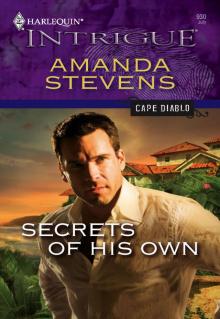 Secrets of His Own
Secrets of His Own The Awakening
The Awakening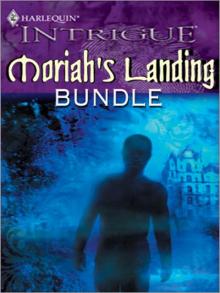 Moriah's Landing Bundle
Moriah's Landing Bundle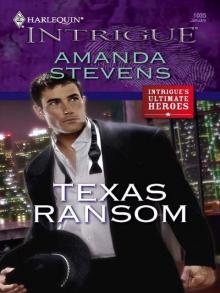 Texas Ransom
Texas Ransom The Restorer
The Restorer The Edge of Eternity
The Edge of Eternity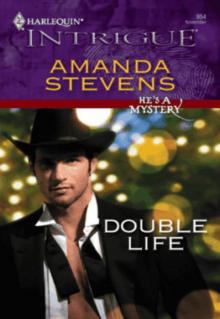 Double Life
Double Life Confessions of the Heart
Confessions of the Heart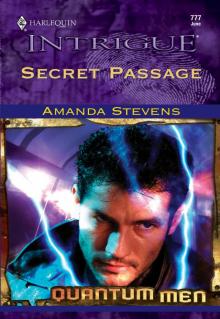 Secret Passage
Secret Passage Kiss and Tell
Kiss and Tell Bishop's Rock
Bishop's Rock The Seventh Night
The Seventh Night Without a Trace
Without a Trace Her Secret Past
Her Secret Past The Innocent
The Innocent The Forgiven
The Forgiven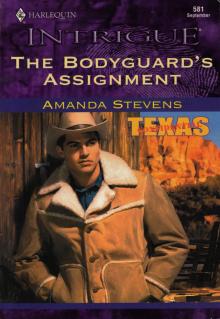 The Bodyguard's Assignment
The Bodyguard's Assignment The Tempted
The Tempted The Whispering Room
The Whispering Room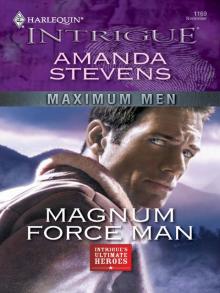 Magnum Force Man
Magnum Force Man The Abandoned
The Abandoned Angels Don't Cry
Angels Don't Cry Matters of Seduction
Matters of Seduction Amanda Stevens Bestseller Collection: Stranger In Paradise/A Baby's Cry
Amanda Stevens Bestseller Collection: Stranger In Paradise/A Baby's Cry The Kingdom
The Kingdom Showdown in West Texas
Showdown in West Texas The Prophet tgqs-3
The Prophet tgqs-3 The Kingdom tgqs-2
The Kingdom tgqs-2 Unauthorised Passion/Intimate Knowledge
Unauthorised Passion/Intimate Knowledge The Prophet (Graveyard Queen)
The Prophet (Graveyard Queen) Dark Obsession
Dark Obsession Secret Sanctuary
Secret Sanctuary Kingsley Baby Trilogy: The Hero's SonThe Brother's WifeThe Long-Lost Heir
Kingsley Baby Trilogy: The Hero's SonThe Brother's WifeThe Long-Lost Heir The Abandoned (the graveyard queen series)
The Abandoned (the graveyard queen series) The Sinner
The Sinner Pine Lake
Pine Lake His Mysterious Ways
His Mysterious Ways